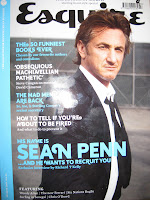 This month's Esquire is, in the journalistic sense, my first-ever cover-story, which feels like rather a special moment, to be frank. No-one who knows me has expressed the slightest surprise that the subject of said cover-story happens to be Sean Justin Penn, but then they know me too well. For the many readers who have never heard of me but are intrigued by SJP, I hope the piece proves useful, and - who knows? - might even lead them toward a spot of further reading, specifically Sean Penn: His Life and Times.
This month's Esquire is, in the journalistic sense, my first-ever cover-story, which feels like rather a special moment, to be frank. No-one who knows me has expressed the slightest surprise that the subject of said cover-story happens to be Sean Justin Penn, but then they know me too well. For the many readers who have never heard of me but are intrigued by SJP, I hope the piece proves useful, and - who knows? - might even lead them toward a spot of further reading, specifically Sean Penn: His Life and Times.One snippet of Sean on Harvey: ‘It did strike me that there could never be a better actor to play Harvey Milk than Harvey Milk. That’s rarely the case: usually you figure you can create a more charismatic character, or else they’ll just cast someone better-looking than the real guy… But Harvey’s particular dear quality was very unusual.’
Need I add that there's plenty more great stuff within these covers this month, including a very useful piece on the '50 Funniest Books Ever Written'? It's a grand selection even though it doesn't have room for Flashman or The Rules of Attraction, and favours Summer Lightning over The Code of the Woosters for some odd reason best known to the literary agent Peter Straus.
The movie reviewed in my regular column is the wonderful Curious Case of Benjamin Button, for which my feelings grow yet more dear even as day by day the picture, most unhappily, is marked yet more woundingly with the stigma of Expected Loser at every Awards Ceremony still to be held in this long-drawn-out Awards Season...


